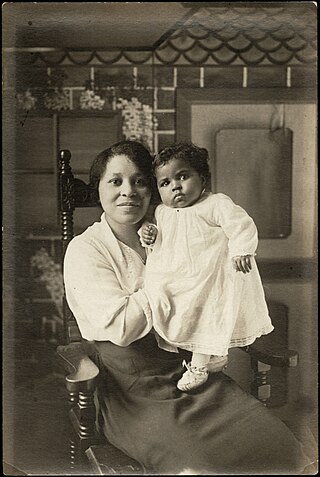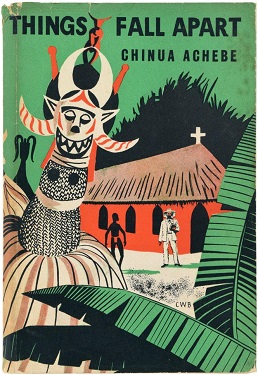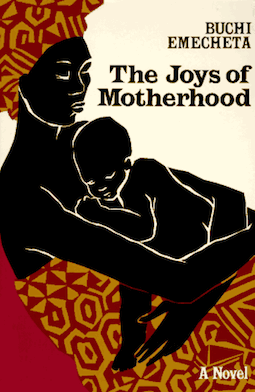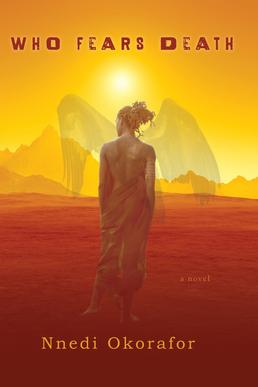
A mother is the female parent of a child. A woman may be considered a mother by virtue of having given birth, by raising a child who may or may not be her biological offspring, or by supplying her ovum for fertilisation in the case of gestational surrogacy.

Chinua Achebe was a Nigerian novelist, poet, and critic who is regarded as the dominant figure of modern African literature. His first novel and magnum opus, Things Fall Apart (1958), occupies a pivotal place in African literature and remains the most widely studied, translated, and read African novel. Along with Things Fall Apart, his No Longer at Ease (1960) and Arrow of God (1964) complete the so-called "African Trilogy"; later novels include A Man of the People (1966) and Anthills of the Savannah (1987). He is often referred to as the "father of African literature", although he vigorously rejected the characterization.
Levirate marriage is a type of marriage in which the brother of a deceased man is obliged to marry his brother's widow. Levirate marriage has been practiced by societies with a strong clan structure in which exogamous marriage is forbidden.

Things Fall Apart is the debut novel by Nigerian author Chinua Achebe, first published in 1958. It depicts pre-colonial life in the southeastern part of Nigeria and the invasion by Europeans during the late 19th century. It is seen as the archetypal modern African novel in English, and one of the first to receive global critical acclaim. It is a staple book in schools throughout Africa and is widely read and studied in English-speaking countries around the world. The novel was first published in the UK in 1962 by William Heinemann Ltd, and became the first work published in Heinemann's African Writers Series.

Florence Onyebuchi "Buchi" Emecheta was a Nigerian-born novelist, based in the UK from 1962, who also wrote plays and an autobiography, as well as works for children. She was the author of more than 20 books, including Second Class Citizen (1974), The Bride Price (1976), The Slave Girl (1977) and The Joys of Motherhood (1979). Most of her early novels were published by Allison and Busby, where her editor was Margaret Busby.

Efuru is a novel by Flora Nwapa which was published in 1966 as number 26 in Heinemann's African Writers Series, making it the first book written by a Nigerian woman, in fact, any African woman, to be published internationally. The book is about Efuru, an Igbo woman who lives in a small village in colonial West Africa. Throughout the story, Efuru wishes to be a mother, though she is an independent-minded woman and respected for her trading ability. The book is rich in portrayals of the Igbo culture and of different scenarios, which have led to its current status as a feminist and cultural work.

Nigerian literature may be roughly defined as the literary writing by citizens of the nation of Nigeria for Nigerian readers, addressing Nigerian issues. This encompasses writers in a number of languages, including not only English but Igbo, Urhobo, Yoruba, and in the northern part of the county Hausa and Nupe. More broadly, it includes British Nigerians, Nigerian Americans and other members of the African diaspora.
Ifi Amadiume is a Nigerian poet, anthropologist and essayist. She joined the Religion Department of Dartmouth College, New Hampshire, US, in 1993.
African literature is literature from Africa, either oral ("orature") or written in African and Afro-Asiatic languages. Examples of pre-colonial African literature can be traced back to at least the fourth century AD. The best-known is the Kebra Negast, or "Book of Kings."

Catherine Obianuju Acholonu was a Nigerian author, researcher and political activist.

Florence Nwanzuruahu Nkiru Nwapa, was a Nigerian author who has been called the mother of modern African Literature. She was the forerunner to a generation of African women writers, and the first African woman novelist to be published in the English language in Britain. She achieved international recognition with her first novel Efuru, published in 1966 by Heinemann Educational Books. While never considering herself a feminist, she was best known for recreating life and traditions from an Igbo woman's viewpoint.

Onyeka Nwelue is a Nigerian filmmaker, publisher, talk-show host, author, academic visitor and founder of the James Currey Society, at the African Studies Centre, University of Oxford and a Visiting Scholar to the Centre of African Studies in the University of Cambridge. He is the Dean of the School of Cinematographic Studies at Université Queensland in Haiti.

The Thing Around Your Neck is a short-story collection by Nigerian author Chimamanda Ngozi Adichie, first published in April 2009 by Fourth Estate in the UK and by Knopf in the US. It received many positive reviews, including: "She makes storytelling seem as easy as birdsong" ; "Stunning. Like all fine storytellers, she leaves us wanting more".

The Joys of Motherhood is a novel written by Buchi Emecheta. It was first published in London, UK, by Allison & Busby in 1979 and was first published in Heinemann's African Writers Series in 1980 and reprinted 1982, 2004, 2008. The basis of the novel is the "necessity for a woman to be fertile, and above all to give birth to sons". It tells the tragic story of Nnu-Ego, daughter of Nwokocha Agbadi and Ona, who had a bad fate with childbearing. This novel explores the life of a Nigerian woman, Nnu Ego. Nnu's life centres on her children and through them, she gains the respect of her community. Traditional tribal values and customs begin to shift with increasing colonial presence and influence, pushing Ego to challenge accepted notions of "mother", "wife", and "woman". Through Nnu Ego's journey, Emecheta forces her readers to consider the dilemmas associated with adopting new ideas and practices against the inclination to cleave to tradition. In this novel, Emecheta reveals and celebrates the pleasures derived from fulfilling responsibilities related to family matters in child bearing, mothering, and nurturing activities among women. However, the author additionally highlights how the 'joys of motherhood' also include anxiety, obligation, and pain.

Everything Good Will Come is a coming-of-age novel by Nigerian author Sefi Atta about a girl growing into a woman in postcolonial Nigeria and England. It was published by Interlink World Fiction in 2005, and won the Wole Soyinka Prize for Literature in Africa.

Who Fears Death is a science fantasy novel by Nigerian-American writer Nnedi Okorafor, published in 2010 by DAW, an imprint of Penguin Books. It was awarded the 2011 World Fantasy Award for Best Novel, as well as the 2010 Carl Brandon Kindred Award "for an outstanding work of speculative fiction dealing with race and ethnicity." Okorafor wrote a prequel, the novel The Book of Phoenix, published by DAW in 2015.
Ifeoma Okoye is a Nigerian novelist. She has been referred to by fans as "the most important female novelist from Nigeria after Flora Nwapa and Buchi Emecheta," according to Oyekan Owomoyela. She was born in Anambra State in Eastern Region, Nigeria. She went to school at St. Monica's College in Ogbunike to receive a teaching certificate in 1959. She then graduated from the University of Nigeria in Nsukka to earn a Bachelor of Arts honours degree in English in 1977. She wrote novels including Behind the Clouds, children's novels and short stories, such as The Village Boy and Eme Goes to School.

Obioma Paul Iwuanyanwu known mononymously as Obiwu, is a Nigerian-American writer and professor. He is a survivor of the Igbo genocide in Nigeria (1966–1970), and teaches World Literature and Critical Theory in the Humanities Department at Central State University.
Akachi Adimora-Ezeigbo is a Nigerian author and educator, whose published work includes novels, poetry, short stories, books for children, essays and journalism. She is the winner of several awards in Nigeria, including the Nigeria Prize for Literature.

The Third Generation of Nigeria Writers is an emerging phase of Nigerian literature, in which there is a major shift in both the method of publishing and the themes explored. This set of writers are known for writing post-independence novels and poems. This generation is believed to be influenced by the western world, politics and the preceding generation of Mbari Club writers, Flora Nwapa and Buchi Emecheta. The emergence of the third generation of Nigerian writers has changed the publishing sector with a resurgence of new publishing firms such as Kachifo Limited, Parrésia Publishers, Cassava Republic Press and Farafina Books. These new writers create new genres and methods that deal with racism, class, abuse and violence.














